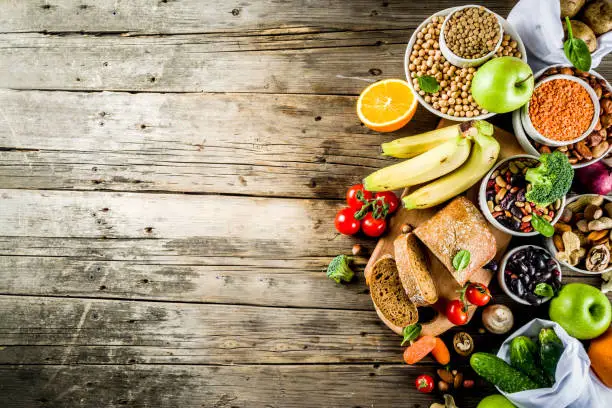
You have probably encountered food labels proudly proclaiming, “High in fiber!” But have you ever wondered why fiber is considered so important for your health, doesn’t matter if you are a nutrition coach, a sports nutrition expert, or simply someone looking to maintain general well-being? In this post, we will explore how fibers are beneficial for your health, their types, and how to ensure you are getting enough of them in your daily diet.
Why Fiber Matters:
Digestive Health: Fiber plays a crucial role in maintaining a healthy digestive system. It aids in regular bowel movements, prevents constipation, and reduces the risk of digestive disorders like diverticulitis.
Weight Management: High-fiber foods tend to be more filling, which can help control your appetite and promote weight management. Fiber-rich foods often require more chewing, slowing down your eating pace and giving your brain time to register that you are full.
Blood Sugar Control: Fiber can help regulate blood sugar levels by slowing the absorption of sugar, which is particularly beneficial for individuals with diabetes or those at risk of developing it.
Heart Health: A diet rich in fiber is associated with a lower risk of heart disease. It helps reduce bad cholesterol levels, lower blood pressure, and maintain a healthy weight, all of which are factors that contribute to heart health.
Gut Microbiota: Fiber serves as a valuable source of nutrition for the beneficial bacteria in your gut. A healthy gut microbiome is linked to various health benefits, including a stronger immune system and better mental well-being.
Types of Fiber
➤ Soluble Fiber: This type of fiber can dissolve in water like sugar in your tea. It’s your heart’s buddy. It helps lower your cholesterol levels, which in turn lowers the risk of heart disease. You can find soluble fiber in things like oats and beans.
➤ Insoluble Fiber: This fiber doesn’t like to mix with water; it’s a bit of a rebel. It helps you feel full and keeps your digestive system moving smoothly. So, it’s great for your tummy and waistline. You will find insoluble fiber in whole grains and veggies.
Now, when it comes to how much fiber we need, women should aim for around 21 to 25 grams of fiber a day, and men should shoot for about 30 to 38 grams. But here’s the kicker: most of us are falling short on fiber.
| According to the Smarty Pants at the Harvard School of Public Health, the average American only gets about 15 grams of fiber each day. This might be because we are chowing down on more processed and fast foods these days, which aren’t exactly fiber-rich. So, it’s time to load up on whole grains, fresh fruits and veggies, legumes, and nuts to get the right kinds and amounts of fiber for a healthier you. |
Types of Food That Are High in Fiber
1. Chia Seeds (10g per 1 oz):
Chia seeds are like tiny fiber powerhouses. They are loaded with omega-3 fatty acids and a bit of protein. Sprinkle them on salads, blend them into smoothies, or whip up a chia seed pudding for a delightful treat.
2. Raspberries (8g per 1 cup):
These delicious berries are not only low in calories but are also rich in Vitamin C. You can munch on them by themselves or use them as a delightful topping for your protein-packed yogurt, making for a healthy and tasty snack.
3. Lentils or Black Beans (7.5g and 7g, respectively, per 1/2 cup cooked):
Lentils and black beans are excellent sources of fiber. They bring along a good dose of protein and deliver essential vitamins and minerals like Folate, Iron, Potassium, and Zinc.
4. Whole-wheat spaghetti (6g per 1 cup, cooked):
Spaghetti doesn’t have to be heavy and indulgent. Pair it with a tomato-based sauce loaded with chopped veggies like onions, zucchini, bell peppers, or yellow squash, and add a lean protein like chicken or turkey for a colorful, balanced meal.
5. Pear (5.5g per 1 medium pear):
This sweet fruit is not only a low-calorie treat but also a good source of fiber, Vitamin C, and Potassium. Don’t forget to enjoy the skin, as it’s packed with goodness.
6. Broccoli (5g per 1 cup chopped):
Broccoli is a super-veggie. It provides Vitamin C, Vitamin K, Iron, Potassium, and even some protein – 2.5g per cup. It’s a versatile addition to your meals.
7. Oatmeal (5g per 1 cup, cooked):
A simple and healthy breakfast choice. Add chia seeds for extra fiber and healthy fats. You can also mix in some protein powder to keep you energized throughout the morning.
8. Green Peas (4.5g per 1/2 cup, cooked):
These legumes are not only rich in fiber but also offer generous amounts of Vitamin A and Vitamin K. They are great in stir-fries or as a tasty side dish.
9. Apple, with skin (4.5g per 1 medium apple):
An easy on-the-go snack that’s rich in fiber and Vitamin C. No need to refrigerate, making it a convenient choice.
10. Baked Potato, with skin (4g per 1 medium potato):
Baked potatoes can be healthy without heaps of butter and sour cream. Try a small amount of butter and swap sour cream for plain Greek yogurt for an extra protein boost. They are also packed with Vitamin B6, Potassium, and Vitamin C.
11. Brussels Sprouts (4g per 1 cup, boiled):
These little green gems provide a whopping 124% of your daily Vitamin C needs in a single serving. Roast them, stir-fry them, or add them to salads for a healthy crunch.
12. Almonds (3.5g per 1 ounce, or 23 nuts):
Feeling hungry? Grab a handful of almonds along with a piece of fruit. They offer healthy fats, 6 grams of protein, and essential nutrients like Vitamin E, Manganese, and Magnesium, making for a satisfying and nutritious snack.